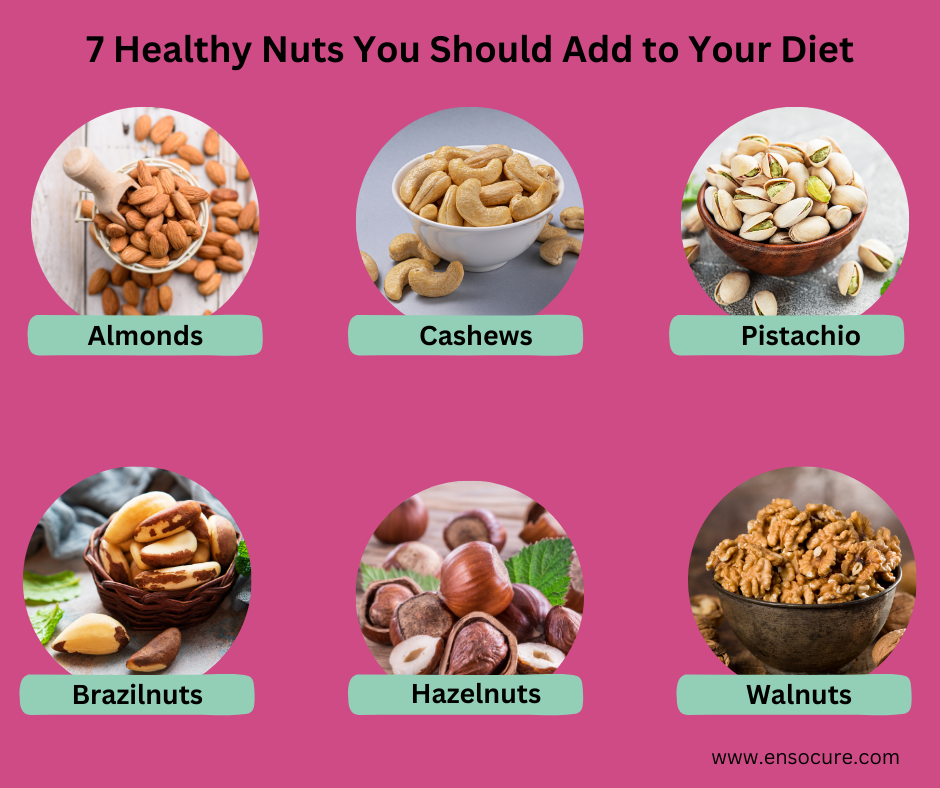Nuts have long been celebrated for their nutritional richness and health benefits. Packed with essential nutrients, healthy fats, and antioxidants, nuts make for a convenient and delicious snack that can contribute to overall well-being. Here are 7 healthy nuts you should add to your daily diet.

1. Almonds
Almonds are a powerhouse of nutrients packing a rich nutritional profile of healthy fats, protein, fiber, vitamin E, magnesium, and antioxidants. Almonds are renowned for their heart-protective qualities because of being a rich source of monounsaturated fats, antioxidants, and magnesium. They also contribute to improving blood pressure, immunity, reduced cholesterol levels, and improved overall cardiovascular health. The combination of protein, fiber, and healthy fats in almonds helps promote satiety, making them a smart choice for those aiming to manage their weight. Almonds also have a low glycemic index, which means they are good for blood sugar control, making them a suitable option for individuals with diabetes.
Almonds are rich in Vitamin E with 30 grams providing 45% of the RDA which is why they are often used in oils for skin and hair health. When consuming almonds, it is always advisable to soak them in water and remove the skin first. Those with kidney stones are advised to avoid eating high quantity of almonds due to the presence of oxalates in them.
2. Pistachios
Pistachios are rich source of Vitamins 1 and B6 good for metabolism, brain health and immunity. These nuts aren’t just delicious but also offer a range of nutrients, including healthy monounsaturated and polyunsaturated fats, protein, fiber, vitamins, and minerals. Pistachios are rich in carotenoids lutein and zeaxanthin, anthocyanins, flavonoids and proanthocyanidins all contributing to heart health, eye health, reduced blood pressure, reduced cholesterol and increase of blood antioxidants.
They also contain resveratrol, which is being considered as a treatment for Alzheimer’s and Parkinson’s disease. Eating pistachios daily can improve health but stick to plain, unsalted pistachio nuts in their shells and keep it at not more than avoid eating more than 30 gms per day.
3. Walnuts:
Walnuts stand out for their high omega-3 fatty acid content, which is uncommon in most nuts. Called brain boosters, they also provide protein, fiber, antioxidants, and essential minerals like calcium, magnesium, potassium and Vitamin E. Walnuts are rich in alpha-linolenic acid (ALA), associated with improved cognitive function and may contribute to protecting the brain from age-related decline. These nuts have also linked to lower levels of LDL cholesterol, lower blood pressure, triglycerides, reduced inflammation, and improved blood vessel function, all of which contribute to heart health. Walnuts are a good source of antioxidants including polyphenols which may help combat oxidative stress and inflammation in the body.
Walnuts are rich in copper (50%), a mineral necessary for energy producing enzymes and neurotransmitter synthesis. Copper also contributes to immune function and blood vessel development. Studies have found eating around 28-50 grams of walnuts daily improves brain function, reduces the risk of dementia, heart disease and type 2 diabetes
4. Cashew Nuts
Cashews are a creamy and versatile nut, offering a nutritional blend of healthy fats, protein, vitamins, and minerals. Rich in magnesium, vitamin K, monounsaturated fats and oleic acid, cashews have always been associated with heart health and healthy blood pressure levels. Cashews are an excellent source of copper, a mineral essential for energy production, connective tissue formation, and antioxidant defenses. Despite being energy-dense, research suggests that moderate nut consumption, including cashews, may not contribute to weight gain and can be part of a healthy diet. Studies have found how eating cashews led to reductions in blood pressure and triglyceride levels.
5. Brazil Nuts: Selenium Superstars:
Brazil nuts are selenium superstars known for their exceptionally high selenium content (984%) . They also provide healthy fats, protein, and essential minerals. Selenium is a crucial mineral for the body’s antioxidant defenses, thyroid function, and immune system. Brazil nuts are an exceptional source of selenium, with just a few nuts providing the daily recommended intake. Besides being a powerhouse of selenium, Brazil nuts are also rich in other antioxidants, vitamins and minerals like magnesium, manganese, and vitamin E contributing to blood sugar and blood pressure regulation, nerve function, energy production, heart health and reducing inflammation and oxidative stress.
Due to their high selenium content, it’s essential to consume Brazil nuts in moderation. Excessive selenium intake can have adverse effects.
6. Hazelnuts
Hazel nuts are pack a lot of healthy fats, protein, and fiber including vitamins and minerals like manganese, magnesium, and vitamin E. A rich nutrient profile, hazelnuts possess antioxidant and anti-inflammatory properties mainly because of high amounts of plant compounds like gallic acid, epicatechin, caffeic acid, and quercetin which is well known for its neuroprotective properties in diseases like Alzheimer’s.
A 2016 review of 9 studies found how regularly eating hazelnuts can reduce risk of elevated LDL cholesterol and total cholesterol, the main factors of heart disease.
7. Peanuts
Peanuts are rich in plant protein and packed with polyphenol antioxidants. They are also high in folate (Vit B 9) which contributes to fetal and placental development. Peanuts technically belong to the legume family, but their nutrient profile is like that of tree nuts with several health benefits. Peanuts are also rich in Vit B3, and magnesium with studies suggesting they can even lower the risk of heart disease. However, the benefits of peanut can be derived from consuming the nuts and not so much peanut butter.
Integrating nuts into your daily diet isn’t just good for taste, they are a super health-conscious choice that offer a spectrum of nutrients that support heart health, brain function, weight management, and overall well-being. Whether enjoyed as a snack on their own, sprinkled on salads, or blended into nut butter, these nuts provide a satisfying and nutritious boost. As with any food, moderation is key, and it’s advisable to consider individual dietary needs and potential allergies. Those with allergies to nuts are advised to avoid them.

